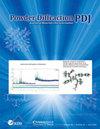Crystal structure of danofloxacin mesylate (C19H21FN3O3)(CH3O3S)
IF 0.4
4区 材料科学
Q4 MATERIALS SCIENCE, CHARACTERIZATION & TESTING
引用次数: 0
Abstract
The crystal structure of danofloxacin mesylate has been solved and refined using synchrotron X-ray powder diffraction data and optimized using density functional theory techniques. Danofloxacin mesylate crystallizes in space group P1 (#1) with a = 6.77474(8), b = 12.4973(4), c = 12.82826(28) Å, α = 84.8709(29), β = 87.7501(10), γ = 74.9916(4)°, V = 1044.723(11) Å3, and Z = 2. The protonation of the danofloxacin cations was established by the analysis of potential intermolecular interactions and differs from that expected from isolated-cation calculations. The crystal structure consists of alternating layers of cations and anions parallel to the ac-plane. There is parallel stacking of the oxoquinoline rings along the a-axis. The expected N–H⋯O hydrogen bonds between the cations and anions are not present. Each cation makes an N–H⋯O hydrogen bond with the other cation, resulting in zig-zag chains along the a-axis. Both cations have strong intramolecular O–H⋯O hydrogen bonds. There are several C–H⋯O hydrogen bonds between the danofloxacin cations and mesylate anions. The powder pattern has been submitted to ICDD® for inclusion in the Powder Diffraction File™ (PDF®).甲磺酸丹诺沙星(C19H21FN3O3)(CH3O3S)的晶体结构
利用同步x射线粉末衍射数据对甲磺酸丹诺氟沙星的晶体结构进行了解析和细化,并利用密度泛函理论技术对其进行了优化。甲磺酸达诺氟沙星在P1(#1)空间群中结晶,a = 6.77474(8), b = 12.4973(4), c = 12.82826(28) Å, α = 84.8709(29), β = 87.7501(10), γ = 74.9916(4)°,V = 1044.723(11) Å3, Z = 2。丹氧氟沙星阳离子的质子化是通过分析潜在的分子间相互作用确定的,与分离阳离子计算的结果不同。晶体结构由平行于ac平面的阳离子和阴离子交替层组成。氧喹啉环沿a轴平行堆叠。阳离子和阴离子之间预期的N-H⋯O氢键不存在。每个阳离子与另一个阳离子形成一个N-H⋯O氢键,形成沿着a轴的锯齿形链。两种阳离子都具有很强的分子内O - h⋯O氢键。danoflo沙星阳离子和甲磺酸阴离子之间有几个C-H⋯O氢键。粉末图案已提交给ICDD®,纳入粉末衍射文件™(PDF®)。
本文章由计算机程序翻译,如有差异,请以英文原文为准。
求助全文
约1分钟内获得全文
求助全文
来源期刊

Powder Diffraction
工程技术-材料科学:表征与测试
CiteScore
0.90
自引率
0.00%
发文量
50
审稿时长
>12 weeks
期刊介绍:
Powder Diffraction is a quarterly journal publishing articles, both experimental and theoretical, on the use of powder diffraction and related techniques for the characterization of crystalline materials. It is published by Cambridge University Press (CUP) for the International Centre for Diffraction Data (ICDD).
 求助内容:
求助内容: 应助结果提醒方式:
应助结果提醒方式:


